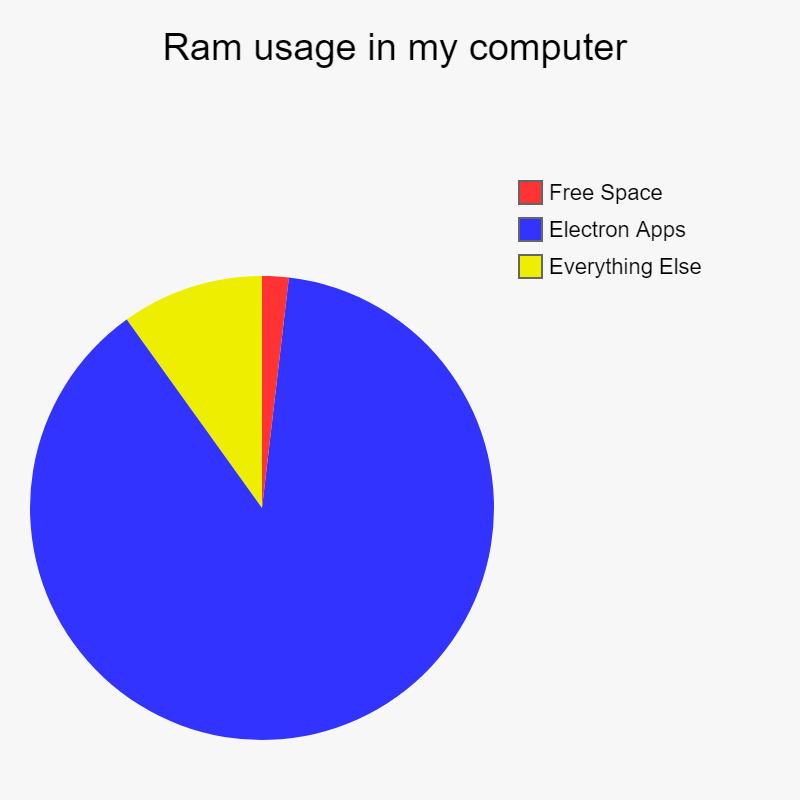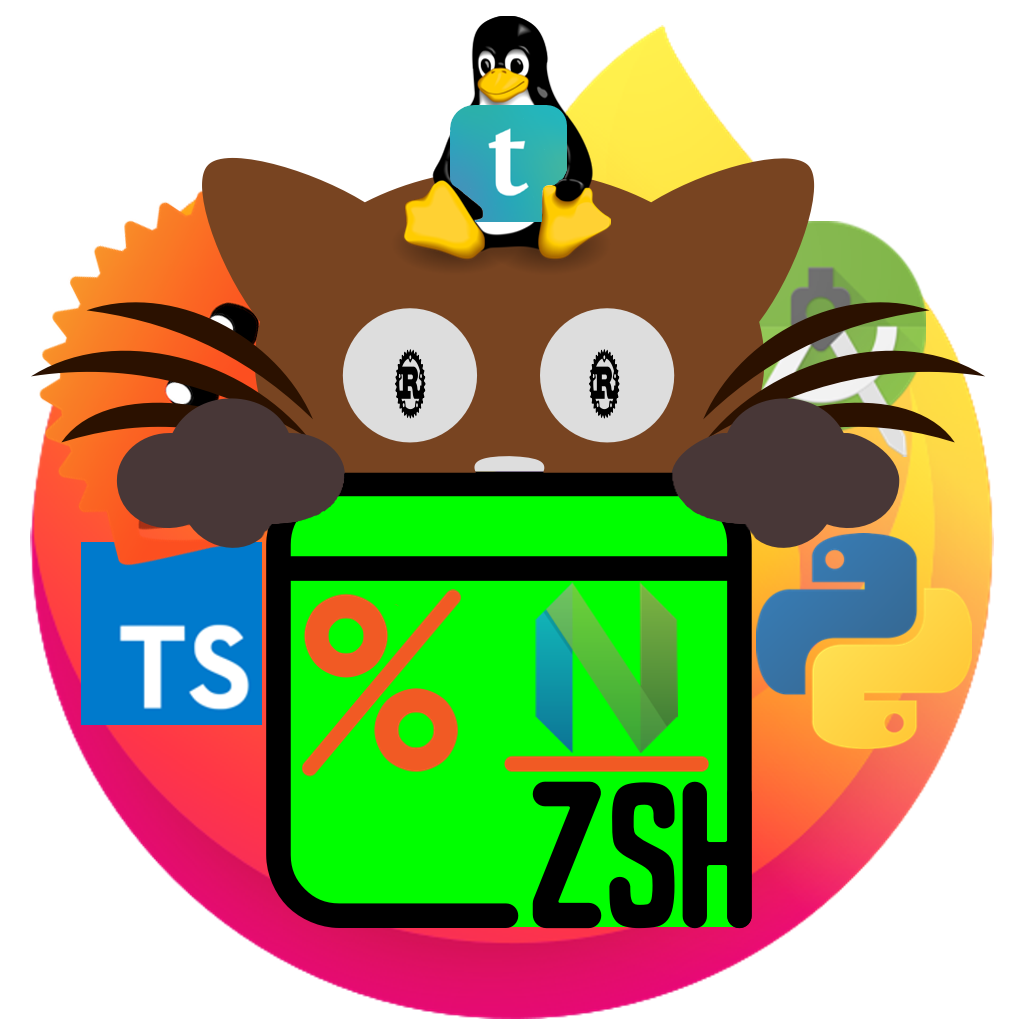World Wide Web was not intended to be an app framework.
Internet was not intended to be worldwide, it was for military purposes. Still, we all evolve.
Still, we all evolve
Speak for yourself,nerd
Yet Internet just scaled up to handle worldwide traffic, while WWW evolved into mess noone is able to implement anymore.
Sorry, what’s the issue with the WWW mess? I don’t get it.
Inspect any major website, you’ll see boilerplate of
<div><div><div><div>and unreadable pile of JavaScript programs your browser need to run to build the website. Sites should be done in a way that is still readable after you disable one element (for example disable CSS function, scripts or HTML specific tag).Internet is modular, based on stacked protocols. Want to fit Tor between TCP and HTTP? No problem. Web is also like that, build of semi-independent formats, in theory. But in practice devs are using frameworks that assume Chrome, Firefox and Safari are and would ever be the only things existing. Now if you want to develop new browser you not only need to display HTML and add other things later. You need to get all specifications of all standards working right away or sites would spectacularly break.</div></div></div></div>
It’s a bit of a shame that HTML went from describing documents to describing UIs. I do miss the days of simple websites, although I’m not old enough to remember the old old internet.
What’s the alternative? Or an alternative I guess I should say. I agree though, I wish folks would use HTML for all documents. Like why the hell am I downloading a PDF of a thing I’m never printing? (PDFs are still acceptable for printing though.)
PDF is a way to make sure everyone can read the document in the same way (like font type, spaces, special characters…) while HTML can cause multiple issues if you don’t do it properly. And for documentation I would prefer some Markdown as I can edit it with a fancy IDE or feel lazy and do it with terminal editor or plain text editor.
I don’t think there’s anything wrong with using HTML/XML-ish format for describing a UI (although having a standardized presentation format that all “viewers/browsers” follow exactly the same way would be nice), I’m just sad that websites have become described as UIs rather than as well-structured documents.
But that sounds like a problem with developers and languages or frameworks they are using. WWW is all good.
EDIT: I mean, I don’t like YouTube frontend, so I use Invidious, there are always apps better made, just depends on the developers, if they want to track users with monitoring + ads, the web app will generate a spaghetti code with many frameworks, tracking, requests, etc.
Yes, the issue is with web developers not following standards. However, because all of them fail to do this, the problem ends up being with the browser that doesn’t support everyone’s non-standard developments.
I just want my text in the centre of the page (not with rows stretched across a widescreen monitor) and for things to not jump about as they load. Figure out where things should go, then display it.
Web standards? You talk funny, funny man
What else works across as many platforms and screen sizes as well as the combination of HTML/CSS/JS?
Most attempts to build that just lead to a worse version of it.
I’ll be the first to admit it’s bloated to all hell after 25 years of people stacking crap on top of more crap, and it’s perilously close to being completely controlled by Google, but it is what it is.
Maybe I do not specify clearly what I mean.
Why to order taxi, access bank, register a domain name do we have to have apps on all platforms and then to fix this problem we bloat the web by creating webapps. Why not just plain simple HTML website beautified with CSS instead?
Real cross-platform apps are those written in, for example QT. Then came Android and iOS forcing everyone to use their toolkits so we started to abuse poor web.
Well I’m in agreement there.
The only reason they want everything as an app is so they can push notifications and do any tracking they can legally get away with (and some they can’t but who’s gonna know?)
Dominos have locked all their deals that actually make a pizza a normal price that humans would willingly pay for a pizza behind their app. There’s no reason for them to do this. Surely their business model is selling pizza? So now I go to a little family run pizza shop, pay less and get decent pizza.
Yep.
Your standard web browser has to many privacy protections for you and your data.
Its why they want to push you to an app, that asks for WAY to many permissions to do what it needs to do. Cause it doesnt need that access to function. It needs that access to monitize you. Cause they make more off stealing your information, than they do off you being a customer, Which is why you get so many discounts for using apps.
What else works across as many platforms and screen sizes as well as the combination of HTML/CSS/JS?
Doom. It runs on every-fucking-thing
(Undergirded ever so slightly by a Raspberry Pi but don’t mention it)
Would be cool to access to my bank account via Doom.
New Doom speedrun category: controlling with a Porsche
Folks in this thread complaining about Electron I think miss the point. It is a trade-off. It is designed to allow engineers who have a web dev skillset to write desktop apps. For those like me who want to write the occasional hobby app - it’s great. It’s also great for orgs to be able to have cross functional teams. Just like React Native allows this for the mobile world. This could be because they’re small and can’t afford specialist native engineers for each platform they want to support - or it could be that they want to spend their money in other areas and happy to trade off app performance. If it was as lean or as performant as native apps there would be a lot of people in this thread looking for work.
Electron is just the “easiest, most common option”, because things like TauriJS and NeutralinoJS exist, which do what electron does without having to bundle a whole-ass Chrome browser.
It’s not terrible, electron is good for stuff like what you discuss
I just like native apps better haha
Native apps have the potential to be better than electron apps for sure. I get that.
This is a surface level thing though - the question is: would THIS app, written by THAT organisation be better if it was native? Unlikely because they don’t have the skillset for it…otherwise it would have been a native app. Its also likely that less apps would even exist because the barrier to entry is higher without electron and similar.
But this is just a meme and I’m taking this way too seriously!
It’s still terrible because of its ram usage, electron uses minimum 300Mb per instance so that’s 3GB for 10 apps while if you open them all in Chrome you save 100s of mb
Chrome won’t give Web apps access to the file system amongst other things. I’m a firm proponent of web apps - but they can’t do everything a desktop app can, and so electron offers an alternative with the trade offs I mentioned.
I love having multiple copies of Chromium installed on my system at the same time. 250 MB internet messengers please!

You ever notice how everything installs and uninstalls super cleanly and easily these days and software gets consistent regular updates?
That’s because developers stopped min/maxing storage and started bundling all of an application’s dependencies with it instead of trying to rely on globally installed packages and frameworks that can break or be missing or lead to dependency hell.
No one likes larger download sizes and more storage being used but the tradeoff is by and large worth it.
Isn’t this about performance and not storage?
Making and managing an electron app is easier, but it is possible (with more work) to have clean install/uninstall, a nice UI, and consistent regular updates while still being fast and efficient.
Better programs will always need more work to create.
I am curious about what other options there are, and why Electron is what a lot of people go with.
Options:
Native app for each platform:
- Pros: native code is going to be the fastest possible to run and have the smallest dependencies
- Cons: have to write all your code 3+ times in different languages, have less time to develop new features and optimize existing code.
Progressive Web App:
- Pros: single app, write once runs anywhere, no signing keys, no lock in, can be hosted anywhere, runs on everything
- Cons: artificially limited by Apple on iOS, doesn’t have access to deep operating system resources, only what’s exposed through the browser, limited multithreading capabilities
React Native:
- Pros: single app, write once, runs anywhere, similar enough to React Web that a lot of developers will have an easy time learning it
- Cons: still kinda finnicky, not super easy to make it work and perform well across all platforms, you’ll probably still end up having to write some native code, not actually CSS / React Web so still a bit of a learning curve coming from there
Qt:
- Pros: single app, write once, runs anywhere, low level / compiled means that it will be small and performant
- Cons: written in C++, harder to find developers for, harder to implement modern out of the box niceties that CSS gives you for free, poor devX compared to react
.NET MAUI (formerly Xamarin):
- Pros: single app, write once, runs anywhere, low level / compiled enough to be more performant than most web apps out of the box, well documented
- Cons: written in C#, easier to find devs for but not many experts in it specifically, MVVM model is not as pleasant of a devX as React, again no css
Electron:
- Pros: single app, write once, runs anywhere, has full access to operating system resources and deep multithreading if needed, can be as simple as web app in a container or as complex as something like VSCode.
- Cons: takes up more storage and ram since you’re bundling chromium with your app
Flutter is quite nice too. Closer to web dev, but still pretty close to native.
Tauri is also a more recent option, which uses the native webview. Not sure if it’s suitable for production yet though.
People choose Electron because they already know how to write Chromium apps (web dev). It’s really just ease of development, using another framework takes more specialized skills than using Electron.
That’s why everything is Chromium these days.
You ever notice how everything installs and uninstalls super cleanly and easily these days and software gets consistent regular updates?
Not really. Well maybe I take it for granted having switched to Linux.
I mostly hate Electron for the dumb RAM usage.
Pretty sure that’s more about a switch from physical distribution where storage is expensive (CDs) to digital where it’s cheap.
Well, Telegram uses 690 MiB on my system and Thunderbird uses 1.1 GiB.
We live in a timeline where desktop apps all run in a browser, whereas mobile websites are all their own apps.
For now at least, PWAs work on Android and I believe many apps already use electron or something similar under the hood
It seems every new shiny technology today tries its darndest to short-circuit 40+ years of advances in OS virtual memory design. Between Electron and Docker, the entire idea of loading an image into memory once and sharing its pages among hundreds of processes is basically dead. But at least there’s lower support burden!!!1111
I HATE ELECTRON I HATE ELECTRON I HATE ELEC
Electron? More like cringetron
And no, my fellow PHP devs, “Native” PHP’s also not it!
Wait until Tauri will gain popularity.
Yeah, then we can have marginally more responsive web apps.
Seriously though, web apps are usually just optimized like shit in addition to using chrome.
Do you know what this even is? It’s not marginal at all. Check the comparisons of Tauri and Electron. And it does not use Chrome. Electron also doesn’t use Chrome.
It’s chromium, which is basically chrome lol
Basically, but not basically. After all, Chromium is (F)OSS, and Chrome is proprietary.
If I have to load elements from the web just to use the electron app properly, I’d rather use a web app and load the whole page each time and not have the tracking.
We use flutter and the app on iOS and Android look great. The web version looks and works like shit though
At this point JavaScript is Java. Write once, deploy everywhere.
Wouldn’t it be great if there was a way for all these electron apps to share the same runtime so people don’t have to bundle it with their applications.
You know, I bet if the applications without the runtime are small enough, you could probably stream them directly from the internet without even downloading anything up front!
I guess that shared runtime would need some way to browse the applications…
^(vscode gets a pass)
Tja in a world where every OS has its own stupid little UI system, language and IDE…
What does Tja mean?
no idea if this is right or not, but lol

Dutch people use it (although I doubt it’s an official word), meaning something like “that’s what you get” or “oh well”.
deleted by creator
Well, people tend to pick the easiest way to achieve an objective, even though the solution is not simple nor optimised.
Electron is awesome, badly coded apps just suck. Look at Voyager for Lemmy, it’s great and it’s just a web app.
Electron apps are nice in some ways, but use a ton of memory
I usually don’t mind electron apps too much, but I do prefer native apps
No, it’s not nice. Looks good only on Windows where everything have unmaching look anyway.
Lmao, need more title bars to match macOS’ 90s aesthetic?














